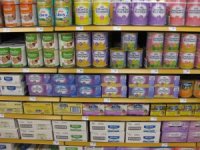
This fall we celebrated a major victory here in California when Governor Brown signed into law the Toxin-Free Infants and Toddlers Act – Assembly Bill 1319 (Butler). AB 1319 phases bisphenol-A (BPA) out of baby bottles and sippy cups, helping to protect our vulnerable developing youth from exposure to this dangerous toxic chemical.
BPA should rightfully be phased out of as many consumer products as possible since numerous adverse health impacts are associated with exposure to the chemical including:
- prostate and breast cancer
- obesity
- ADHD
- altered development of the brain and immune system
- lowered sperm counts
- early-onset puberty
While more consumers have become aware of BPA’s presence in certain hard plastic products like baby bottles, the extent of its use in other products is just surfacing. Canned food items are one such product. Research released from Harvard recently shows alarmingly high levels of BPA in people who consume canned foods several days in a row. It should be noted that canned infant formula falls into this category – something that AB 1319 originally targeted for its BPA ban, but lost out to industry over.
Other recent studies show that BPA replacements are not necessarily safer. Many substitutes are virtually the same as BPA with very minor changes to their chemical structure. As a result, these substitutes are often also endocrine disrupters.
While passing the Toxics-Free Infants and Toddlers Act was a big step in the right direction, obviously much work is left to be done to make sure exposure to BPA and similar chemicals is addressed. But while Sacramento and other governments battle with industry over implementing such protections, what can we consumers do to reduce exposure? Here’s what the National Institute of Environmental Health Sciences has to offer:
- Don’t microwave polycarbonate plastic food containers. Polycarbonate is strong and durable, but over time it may break down from over use at high temperatures.
- Plastic containers have recycle codes on the bottom. Some, but not all, plastics that are marked with recycle codes 3 or 7 may be made with BPA.
- Reduce your use of canned foods.
- When possible, opt for glass, porcelain or stainless steel containers, particularly for hot food or liquids.
- Use baby bottles that are BPA free.


